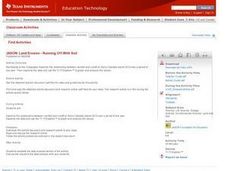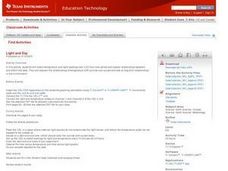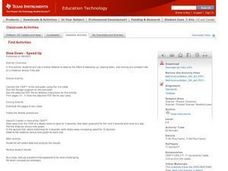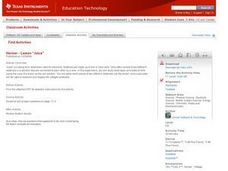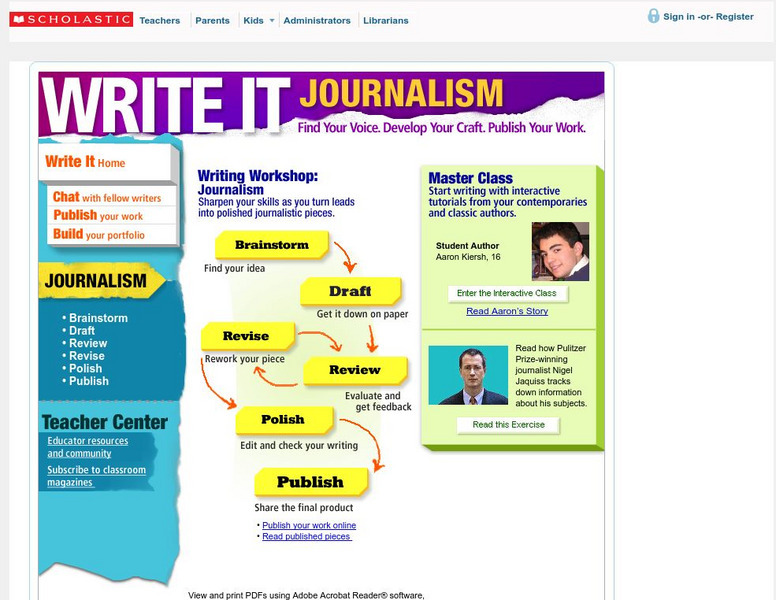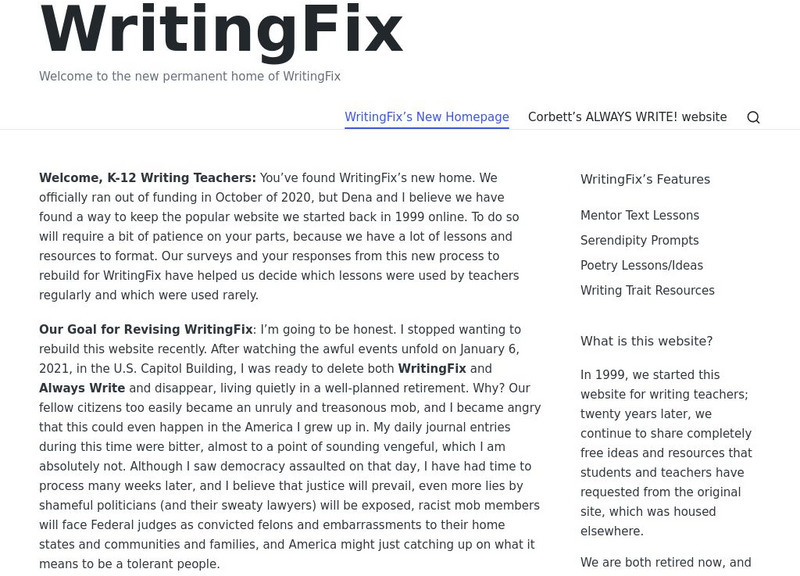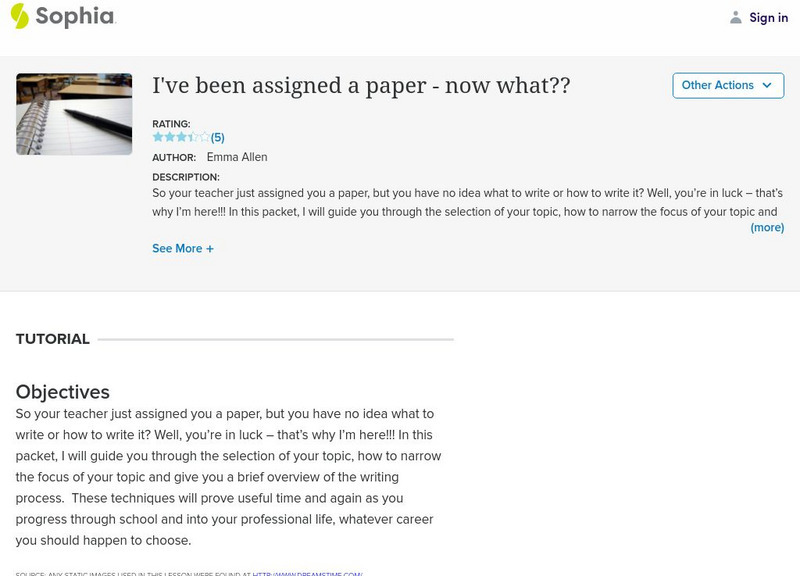Texas Instruments
How Do Pinnipeds Stay Warm?
Learners experiment to determine ways different types of insulation materials work. In this animal adaptation lesson plan, they make hand coverings from plastic bags, shortening, feathers, and wool. They observe effects of these...
Texas Instruments
Land Erosion - Running Off With Soil
Learners evaluate the relationship between rainfall and runoff of a small island for one year. In this rainfall vs. runoff lesson, students analyze the relationship between the rainfall and the runoff on Barro Colorado Island over a...
Curated OER
Biodiversity and Ecosystems
Middle schoolers differentiate between biotic and abiotic factors in this science instructional activity. Learners collect data for the experiment and analyze the data after graphing it using the CBL 2. This experiment is split into two...
Curated OER
Match Me!
Young learners explore motion graphs in this lesson. They investigate distance-time plots as they move in a specific way in front of the CBR in an attempt to make a motion plot that matches a given plot. Pupils explore the connections...
Curated OER
Shedding Light on the Weather with Relative Humidity
Learners study weather using a graphing calculator in this lesson. They collect data for temperature and relative humidity for every hour over a day from the newspaper, then place the data in their handheld calculator and examine it for...
Curated OER
Does Clear Water mean Healthy Water?
Learners test their local aquatic site to determine its water clarity. They collect a water sample and measure its turbidity using a sensor, then they repeat the experiment to obtain a second turbidity reading to find the average value.
Curated OER
The Effect of Acid Rain on Limestone
Pupils investigate the pH of rain water in this earth science lesson. They collect rain water from their area and explore the pH when lime stone is added, then they will use the data collected to conjecture as to the effect of acid rain...
Curated OER
Which Way?
Middle schoolers explore distance-time plots. In this algebra lesson, they will investigate how different types of motion affect the distance-time plot.
Curated OER
What's Your Speed?
Learners explore the concept of distance v. time. They use a CBR to collect data on their distance over time, then plot their data using a scatter plot and find an equation to model their data. Pupils discuss what if scenarios which...
Texas Instruments
Light and Day
Pupils explore the concept of collecting data as they collect data on their graphing calculator about time, temperature, and light. Learners plot the data and create histograms and box and whisker plots to analyze the data.
Curated OER
Slow Down - Speed Up
Pupils explore the concept of distance and time as they use a CBR to mimic distance v. time graphs. Learners walk towards and away from the monitor to create various distance v. time graphs, then discuss what motion creates certain graphs.
Curated OER
Lemon "Juice"
Middle schoolers explore the concept of electricity in this lesson as they measure the electricity that a lemon gives off. Learners use volt meters to measure the amount of electricity coming from the lemon. Your class will also...
Capital Community College Foundation
Guide to Grammar and Writing: The Editing and Rewriting Process
This site examines all aspects of the rewriting process. Includes advice on how to use computers during the process, comments on peer editing, links to related topics, and an editing checklist.
Scholastic
Scholastic: Write It: Journalism
This workshop launches will launch students into the writing process. Read advice from Pulitzer Prize winning journalist Nigel Jaquiss, and read work from other students. The Sandwich Critique is an excellent way to peer review. Finally,...
Scholastic
Scholastic: News Writing With Scholastic Editors
An excellent site for learning about news writing. This site is an in-depth workshop that takes you through the news writing process step by step by providing examples and tips.
Writing Fix
Writing Fix: Writing Fix Homepage
Have you ever needed someone to help you out with your writing? This site offers help to students and teachers. The lessons and resources are organized based on the 6 Writing Traits model. An especially interesting feature of the site is...
Daily Teaching Tools
Daily Teaching Tools: Free Graphic Organizers for Planning and Writing
This Daily Teaching Tools resource provides 30+ graphic organizers to aid in planning and writing. Students will be able to write informational pieces and literary responses.
Google
Google for Education: Finding Patterns in Spelling Errors and History
In this lesson, young scholars analyze spelling errors and large sets of data to find patterns, develop abstractions, and discover how large amounts of data can tell us much about our society.
Sophia Learning
Sophia: I've Been Assigned a Paper, Now What?
This tutorial focuses on selecting and narrowing a topic for a literary paper. It offers a flow chart of the writing process and two videos brainstorming topics using a web-style graphic organizer for each of two novels: "To Kill a...
Colorado State University
Colorado State Writing Center: Guide to Desktop Publishing
This resource provides information about the process of desktop publishing, including the principles of layout and design.
The Write Place
Literacy Education Online: Strategies for Revising and Editing on Computers
Comprehensive discussion on how to edit material on computers. Explains how to perform functions in 2 general areas: spell check and search & replace. Also explains difference between doing this "on paper" and on computer. W.11-12.6...
Daily Teaching Tools
Daily Teaching Tools: Free Graphic Organizers for Planning and Writing
This Daily Teaching Tools resource provides graphic organizers that students can use to plan their written pieces. Graphic organizers for all modes of writing are provided.
Scholastic
Scholastic: Write It: Memoir
Write It Memoir offers a complete writing workshop to develop your personal story. Search your memory through the brainstorming activities to launch your piece. Draft a map of the memories along with reading other models. As the process...
Center for Literacy and Disability Studies, University of North Carolina at Chapel Hill
University of North Carolina: Tar Heel Reader
Students can create, illustrate, and publish books for beginning readers, which are made available for the public to read. Authors must go through the free registration process in order to create a book.



